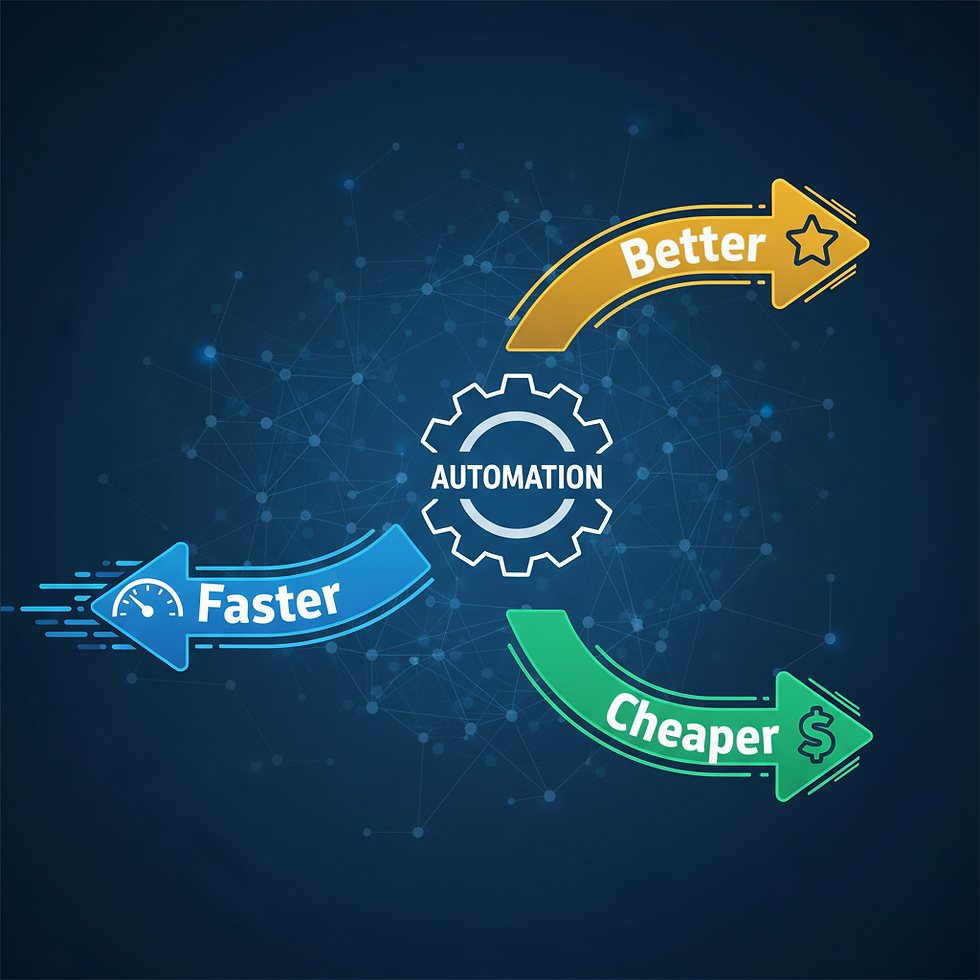AI And The Future Of Work 2025
- Harshal

- Sep 23, 2025
- 3 min read
Who Does The Work - AI, Software, Or Humans?
In discussions with startups about AI-related jobs, one recurring question was my view on AI’s future and its impact on work, companies, and society. That pushed me to explore a few angles, outlined below.
I spent 1 hour writing this. You need 3 minutes to read this.

Related:
Faster, Better, Or Cheaper Work
Automation or technology improves work in 3 ways:
faster,
better, or
cheaper.
AI will not hit all 3 at once.
AI will not achieve all three at once. It may start slower or costlier, but engineers improve AI products over time. The trend is clear: work gets faster, better, or cheaper, and AI drives each of these levers.
Examples:
ChatGPT can help improve your writing or save you time.
Perplexity search, although costlier than Google, can help you find better results.
GenAI art is faster and cheaper than a human artist.

Work By AI, Software, Humans, And Machines
There are 3 main ways to delegate work:
to AI running on GPUs,
to traditional software on CPUs, and
to humans.
AI/GPU capacity will keep growing, even if software and human capacity stayed flat; which they won’t.
Software on CPUs should remain the default for stable, known processes. It may quietly improve as AI helps behind the scenes. For example, humans with AI can build software that covers more edge cases because coding them takes less time.
As automation expands, humans remain essential. New edge cases and judgment gaps appear, and coordination still matters. As AI handles routine tasks, people move to the hard edges.

I added machines in the graph above to show where humans first began accelerating work.
Within automation, there's a distinction between agents and agentic workflows. Agents are all-in-one solutions. You could build AI agents for niche use-cases, but you would struggle to be sure they will not stumble and make compounding mistakes. Workflows, built from modular components, provide greater visibility and trust. They let developers combine software, AI, and human input for more dependable, customizable methods.
Shrinking Role Of Junior Talent
Junior roles will shrink. Many associate-level tasks can be handled by AI. Entry-level paths that rely on repetitive analysis, research, or drafting will decline. New grads will need to prove they can work above the “associate baseline” from day one. The bar shifts from “can you learn on the job” to “can you direct, verify, and extend AI’s output.”
For example, I shifted my spend from a freelance analyst to GenAI coding assistants to write SQL for data analysis. Similarly, businesses need fewer associate data analysts, software engineers, or product managers. Instead, they need senior experts to oversee AI agents.
Many associate-level tasks, like preparing reports or moving data between systems, are now handled by platforms like Zapier, LindyAI, Make, or n8n, further reducing the demand for manual entry-level work.
Rising Value Of Expertise And Judgment
People with hard skills will gain more leverage over people with soft skills. Lawyers, engineers, and doctors will produce more in the same time with AI. The challenge shifts from doing the first draft to reviewing, validating, and making decisions. The winners will be those who can scope problems well, ask precise questions, and test outputs with rigor.
For example, I spoke to a Private Equity firm that has a new investment thesis to acquire services businesses (think legal firms) and uplevel their output using AI to improve their profit margins.
Upskilling Vs Universal Income
Long-term, we may need a Universal Basic Income (UBI), like proposed by Andrew Yang. As AI drives more output with fewer people, the distribution of income and work could break in familiar ways. This is not certain, but it is possible. The social contract may need a new baseline.
AI-Native Startups
AI-native companies will change what is hard about startups. Technical feasibility will be less of a blocker when AI can build features faster, better, and cheaper.
The challenge shifts to business problems:
finding real problems,
acquiring customers,
building trust,
pricing well, and
differentiating when everyone can ship.
Execution will rely less on technical capability and more on strategy, distribution, and relentless iteration.
Elena Verna (Lovable) says AI startups are blowing past milestones. Brendan Short writes about the widening gap between AI-natives and others.

What are your thoughts on the future of AI and automation?
Related:


